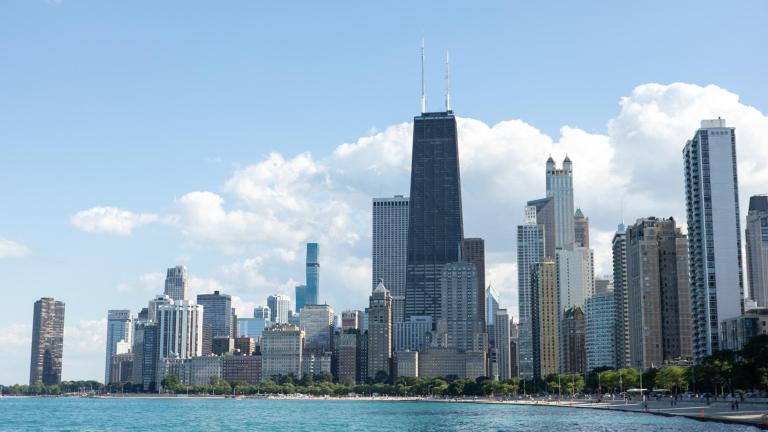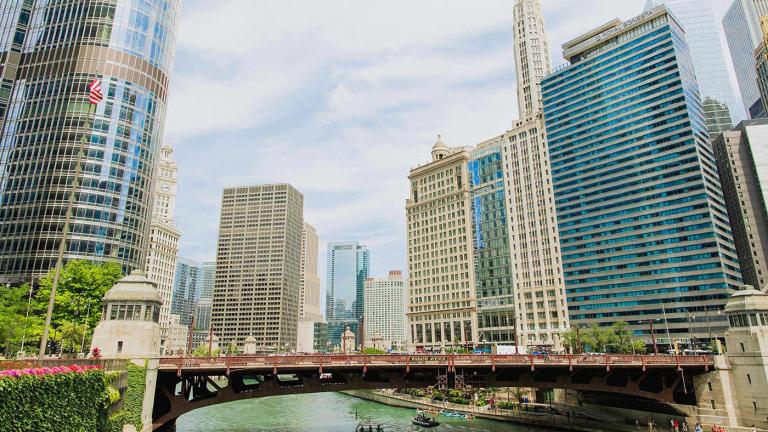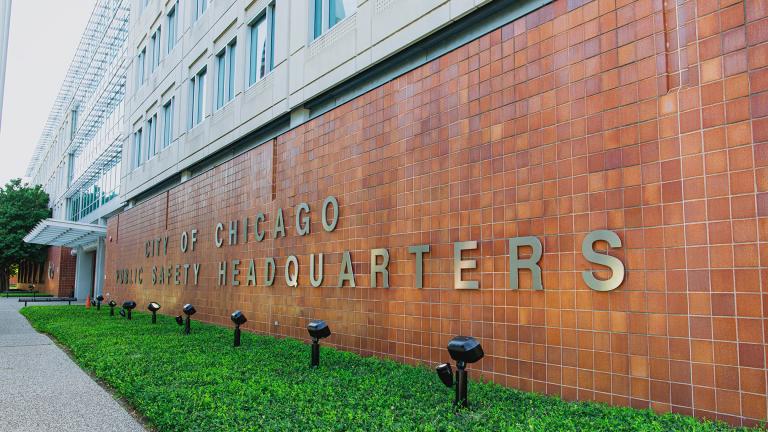The city of Chicago spent at least $441 million on employee overtime in 2022 — 33% more than in 2021, with nearly half of the total amount used to compensate Chicago Police Department officers for working extra hours amid a staffing crunch exacerbated by a surge of crime and violence, according to records obtained by WTTW News.
The Chicago Police Department spent at least $210.5 million on overtime, 56% more than in 2021 and more than double the $100 million earmarked for police overtime set by the Chicago City Council as part of the city’s 2022 budget, according to data obtained by WTTW News through a Freedom of Information Act request and confirmed by the department as accurate on Friday.
Representatives of the Chicago Police Department did not respond to WTTW News’ request for comment about the increase in overtime spending.
The mayor’s office declined to answer detailed questions from WTTW News about the city’s 2022 overtime bill. Mayor Lori Lightfoot lost her bid for reelection last month, and has not taken questions from reporters since March 13.
A statement from a spokesperson for the Department of Finance said the records obtained by WTTW News are “incomplete” because some departments have not yet submitted their “final allocated” spending on overtime for 2022, despite the fact that the year ended nearly three months ago. That information will be available “shortly” on the city’s data portal, officials said.
The records obtained by WTTW News did not include the amount spent on overtime in 2022 by the Department of Planning and Development, the Department of Human Resources, the Law Department and the Office of the Inspector General.
Even without those numbers added in, the total is still well above recent overtime spending.
In April 2020, Lightfoot told the Chicago Sun-Times that the Chicago Police Department needed to stop spending on overtime “like a drunken sailor.”
Between 2019 and 2022, Chicago’s overtime bill soared at least 40%, costing taxpayers an additional $128 million, records show. Lightfoot took office in May 2019.
Overall spending in 2022 was more than 20% higher than it was in 2020, when city officials scrambled to respond to the COVID-19 pandemic, massive protests and unrest caused by the murder of George Floyd in Minneapolis police custody and a hotly contested presidential election.
That increase was driven by overtime spending in several departments called to respond to the increase of crime and violence in Chicago in 2022. The Office of Public Safety Administration spent more than $1.5 million on overtime in 2022, while it spent $850,000 on overtime in 2021, records show.
In addition, the Chicago Fire Department spent 33% more on overtime in 2022 than in 2021, and the Office of Emergency Communications and Management spent 10.6% more on overtime in 2022 than in 2021.
Public safety agencies were not the only city departments to record massive increases in overtime bills, records show.
Four other departments recorded significant increases in overtime spending: the Department of Buildings, the Chicago Public Library, the Department of Finance and the Board of Election Commissioners, records show.
The Board of Election Commissioners did not oversee an election in 2021, requiring its employees to work a minimal amount of overtime that year, spokesperson Max Bever said. However, in 2022, the board oversaw both the June 28 statewide primary election and the Nov. 8 general elections, he said.
In addition, the board prepared for the 2023 Chicago election and implemented the new ward and precinct boundaries drawn to reflect the results of the 2020 census, Bever said. In all, the board spent approximately $744,000 on overtime in 2022, records show.
Representatives of the Department of Buildings, the Chicago Public Library and the Department of Finance did not respond to WTTW News requests for comment.
Only the Chicago Department of Public Health recorded a significant decrease in the amount of overtime it paid its employees, records show. As the public health emergency caused by the COVID-19 pandemic waned, the health department spent less than $346,000 on overtime in 2022, while it spent more than $1.46 million overtime in 2021, records show.
Inspector General Deborah Witzburg said the city’s massive overtime bill in 2022 makes it clear that instead of providing strategic and thoughtful leadership, the administration of Mayor Lori Lightfoot has lurched from crisis to crisis.
“This is a pattern we have seen across the city,” Witzburg said. “This is a symptom of a larger problem.”
During former Chicago Police Supt. David Brown’s appearance before the City Council’s Budget Committee in October 2022 to defend the department’s $1.94 billion budget for 2023, he blamed special events like Lollapalooza for the department’s inability to stay within its overtime budget.
Police staffing has become a major issue in the runoff for Chicago mayor, with former Chicago Public Schools CEO Paul Vallas promising to increase the number of officers as quickly as possible to fight crime, while Cook County Commissioner Brandon Johnson promises to promote 200 officers to detective and fund efforts designed to address the root causes of crime.
Lightfoot faced sustained criticism for supporting Brown’s decision to cancel officers’ scheduled days off during the violent summer months in 2022.
The leadership of the Fraternal Order of Police, Lodge 7, which represents the department’s rank-and-file members, said Brown’s decisions to cancel officers’ personal days not only contributed to officer burn out but also to a spate of suicides by officers.
Police union President John Catanzara did not respond to a request for comment from WTTW News about police overtime spending.
A probe by the inspector general’s office found that more than 1,000 members of the Chicago Police Department were scheduled to work 11 or more consecutive days between April 1 and May 31. The day after Witzburg’s report, Lightfoot and Brown reversed course and announced that officers would get at least one day off every week.
Chicago’s watchdog has been warning for more than six years that the money spent to pay officers overtime was “wasted” and fueled burnout, making misconduct and abuse more likely, first in an audit released in 2017 and then in a follow-up audit released in February 2020.
That audit included a recommendation that Police Department leadership should “limit the total hours officers work, including secondary employment, in order to ensure officers are well-rested and ready to effectively serve the public.” That policy has not been implemented.
Chicago’s next mayor must “right size the footprint of the police department” by deciding which functions sworn officers should be responsible for, what non-sworn members of the department should tackle and which should be handled by another city department or agency, Witzburg said.
The first step would be to commission a “thorough and transparent” report that determines where and when officers should be deployed, even though previous reports have been treated as a “legal and political football,” Witzburg said.
At Brown’s request, the University of Chicago’s Crime Lab did just that. But Brown declined to publicly release the report, even after the Chicago Tribune reported that it concluded that the department was not assigning officers to work when and where most violent crimes were taking place at night on the South and West sides.
Any effort to move police resources from wealthy areas of the city would be sure to trigger an outcry from members of the Chicago City Council and residents of the North Side and downtown.
“An overtime bill of this scale suggests we are getting it wrong,” Witzburg said.
Contact Heather Cherone: @HeatherCherone | (773) 569-1863 | [email protected]







